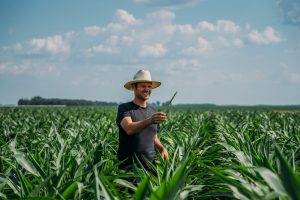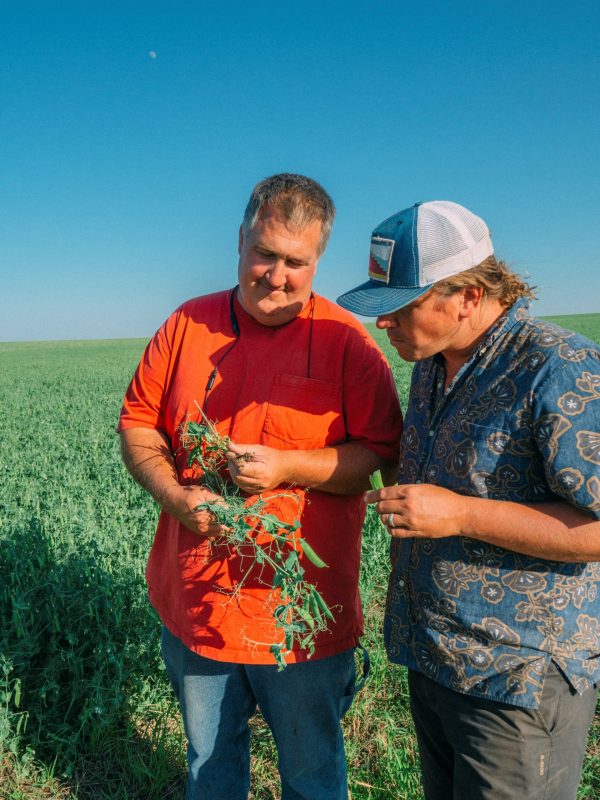Fund provides capital to support farmers through transition to organic
By Brandon Welch
Industrial agriculture has subverted the economy of nature, degraded planetary ecosystems, and created some of the largest challenges humanity has ever faced, such as climate change and the loss of biodiversity and fertile soils. The modern industrial agricultural system has gutted rural America, and yet this system of agriculture is expanding across the globe.
Maximizing health of soil, plants, people, and animals
We must change course. We need a paradigm shift that creates system change. There is no “silver bullet” to solve the current crisis. The system needs re-imagining, re-working, and re-creation from culture, economy, policy, diet, and technology. We need a rebellion to drive the next great revolution in agriculture.
The rebellion is regenerative organic agriculture, a system of farming principles and practices that focuses on maximizing the health of soil, plants, people, and animals. Regenerative organic agriculture takes a living systems approach to work with nature, rather than against it.
How will farms change into something different? Change happens farm-by-farm, from the ground up. Yet, how does a farmer take their first step? How does a farmer find the off-ramp into a different system without going bankrupt?
Solutions to help farmers transition to regenerative and organic
At Mad Agriculture we are here to support those farmers. We don’t have all the answers, but we do have the tools to help any farmer take the next step towards their vision. Mad Agriculture is working from financing to markets and soil to shelf to catalyze a revolution in regenerative and organic agriculture.
Every farm and farmer face a different set of obstacles. When capital is the primary barrier, there are few solutions to help farmers transition into regenerative and organic farming systems. That’s why we created the Perennial Fund.
The Perennial Fund is financing built for organic farmers and farmers making the transition. We replace traditional capital with operating loans and lines of credit that liberate farmers from the industrial shackles of “traditional” debt obligations (i.e., bank requirements for genetically modified seeds, synthetic inputs, etc.), and enable the transition to regenerative organic agriculture.

John Schultz, a farmer in Wells, Minnesota, has received support
from the Perennial Fund
We offer a 10-year commitment to financing farmers through their entire organic transition. We equip farmers with capital to thrive during the three-year organic transition and help them build their own working capital reserve so they have the flexibility to reinvest in soil health.
Each loan is structured farm-by-farm, to ensure farmers are on the path to debt-free farming within 10 years. Payback is tailored to the individual farm to match the farmer’s personal cash flow. The Perennial Fund is a very flexible farmer-first loan.
Access new value-added markets
Farmers can also work with our staff crop marketers to access new value-added markets beyond organic premiums with diversified strategies. Mad Agriculture works with farmers to connect them with value-aligned food brands and can also do the contracting to get a fair price and create stability for both the brands and the farmers. As one example, Mad Agriculture helped Nebraska regenerative farmer Steve Tucker connect with Kristy Lewis, CEO of Quinn Snacks, to supply regeneratively grown crops such as milo for Quinn’s products.
Mad Agriculture and the Perennial Fund are now working with more than40 farmers who are managing over 50,000 acres. Our primary focus is in the Midwest with grain farmers who want to improve their soil health.
Farmers say the Perennial Fund has opened new opportunities for their farms.
“We have had our heads down for 20-plus years doing what we knew was right in our hearts but no one cared. We are beyond excited at the opportunities that have become available. It is great to be in great company with all of you! ” says Eric Klein of Hidden Stream Farm, Elgin, Minnesota.
“The Perennial Fund gives us the opportunity to network with buyers and potential markets, and to learn and connect with farmers that are also working through their own transitions,” says Mitch Brummond of R.D. Brummond & Sons, Stewartsville, Minnesota.
Looking at the big picture, Perennial Fund is inspired by the ecological principles, structure and function of ecosystems, like the tallgrass prairie, redwood forests, or tropical rainforests. These systems are nature’s most mature, beautiful, and resilient expression of economy, characterized by co-evolution, circularity, diversity, symbioses, closed feedback loops, reciprocity between life and death, and a low natural rate of return.
The Perennial Fund is receiving support from many investors and organizations including Patagonia’s Tin Shed Ventures, USDA-Natural Resource Conservation Service’s Conservation Innovation Grant, Midwest Organic and Sustainable Education Services (MOSES), Dr. Bronner’s, Mighty Arrow Family Foundation, and others.
If you are an organic farmer or a transitioning farmer and would like more information, visit www.ThePerennialFund.com and www.MadAgriculture.org.
Brandon Welch is director of radical capital at Mad Agriculture. He can be reached by phone or text at 312-380-1411 or email brandon@madagriculture.org.





